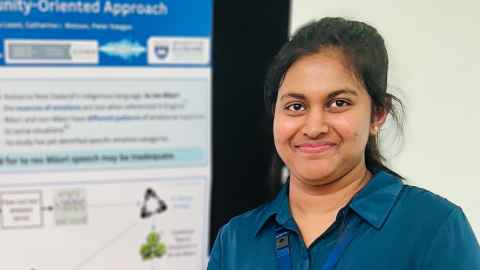Himashi Rathnayake
Doctoral candidate in the Faculty of Engineering and Design

Tell us a bit about yourself
I come from Sri Lanka, a small island in the Indian Ocean known for its natural beauty, from beaches and mountains to waterfalls and ancient ruins. It is also a country rich in culture, heritage, and warm hospitality.
Growing up in Sri Lanka gave me a strong sense of community and fairness, which have shaped my personal and academic journey.
I enjoy watching thriller movies and TV series because I love unexpected twists. After moving to New Zealand, cooking became one of my favourite hobbies, and I love trying out different recipes. I also enjoy spending time in nature, going for walks or hikes, and relaxing at the beach.
What's next on your travel bucket list?
I would love to take a campervan trip through New Zealand’s South Island, especially places like Queenstown. The stunning views, hiking trails, and outdoor adventures make it the perfect escape into nature. I have never travelled in a campervan before, but it is something I have dreamed of since childhood, inspired by stories I read in books.
What are you most passionate about?
I am passionate about conducting research that builds technology for under-represented languages. While most technology development focuses on a small set of dominant languages, I believe that everyone should have the opportunity to access and benefit from technology in their own language.
I have previously worked on systems that classify text in Sinhala, my native language, and have seen the challenges faced by under-represented languages in digital spaces. These experiences led me to choose my current research on understanding emotions in te reo Māori speech.
What is the title of your thesis?
Co-developing a Speech Emotion Recognition System for te reo Māori. (This means developing emotion-based technology for Māori, with support and guidance from the Māori community.)
How did you end up in your field of study?
I ended up in Engineering because I have always loved mathematics and problem solving. I was curious about how websites and mobile apps work, so I chose Computer Systems Engineering.
During my studies, I learned about Artificial Intelligence and noticed that most AI technologies focus on only a few major languages. Others, like my native language Sinhala and New Zealand’s Indigenous language, te reo Māori, are often left out. That inspired me to find solutions that promote fairness and help make AI more inclusive for everyone.
What do you hope will change in your field as a result of your research?
Often, technologies are built on assumptions that overlook cultural differences, resulting in tools that may be technically advanced but culturally disconnected. I hope my research encourages people to rethink these assumptions and involve communities in tech development, so we can create solutions that are both smart and inclusive.
What do you plan to do once you have finished your doctorate?
I will probably continue into an academic career. I am excited to keep working on issues related to under-represented languages and making technology more inclusive. I also want to share these experiences with younger generations and help inspire others to work in this space.
If you could invite four people to dinner, who would they be, and why?
I would invite Paul Ekman and James A. Russell, whose work I have referenced a lot in my research on emotions. I would love to share my methods with them and hear their thoughts.
I would also invite Dr Hinemoa Elder, a New Zealand psychiatrist who talked about the cultural nuances of Māori emotions. Her insights would be really valuable.
Lastly, I’d invite my partner, who has supported me through every step of this journey. It would mean a lot to share that moment with them.